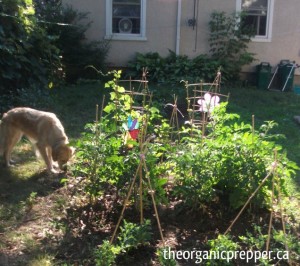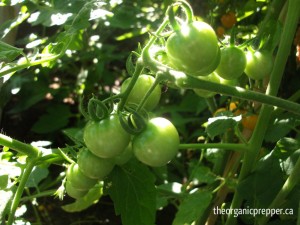Sometimes I think that the next Revolutionary War will take place in a vegetable garden.
Instead of bullets, there will be seeds. Instead of chemical warfare, there will be rainwater, carefully collected from the gutters of the house. Instead of soldiers in body armor and helmets, there will be back yard rebels, with bare feet, cut-off jean shorts, and wide-brimmed hats. Instead of death, there will be life, sustained by a harvest of home-grown produce. Children will be witness to these battles, but instead of being traumatized, they will be happy, grimy, and healthy, as they learn about the miracles that take place in a little plot of land or pot of dirt.
Every day, the United Nations and the Powers That Be take steps towards food totalitarianism. They do so flying a standard of “sustainability” but what they are actually trying to sustain is NOT our natural resources, but their control.
This morning I came across one of the most inspiring, beautifully written articles that I’ve had the pleasure of reading in a long time. Julian Rose, a farmer, actor, activist, and writer, wrote an article called Civil Disobedience or Death by Design and it is a “must read” for anyone who believes in the importance of natural food sources:
“From now on, unless we cut free of obeisance to the centralised, totalitarian regimes whose takeover of our planet is almost complete, we will have only ourselves to blame. For we are complicit in allowing ourselves to become slaves of the Corporate State and its cyborg enforcement army. That is, if we continue to remain hypnotized by their antics instead of taking our destinies into our own hands and blocking or refusing to comply with their death warrants. This ‘refusal’ is possible. But it will only have the desired effect when, and if, it is contemporaneous with the birthing of the Divine warrior who sleeps in us all. The warrior who sleeps-on, like the besotted Rip Van Winkle in the Catskill mountains.”
Does it sound dramatic to state that if things continue on their current path of “sustainability” that we are all going to die? If you think I’m overstating this, read on. The case is clear that we are going to soon be “sustained” right into starvation via Agenda 21.
- The European Union is in the process of criminalizing all seeds that are not “registered”. This means that the centuries-old practice of saving seeds from one year to the next may soon be illegal.
- Collecting rainwater is illegal in many states, and regulated in other states. The United Nations, waving their overworked banner of “sustainability” is scheming to take over control of every drop of water on the globe. In some countries people who own wells are now being taxed and billed on the water coming from those sources. Nestle has admitted that they believe all water should be privatized so that everyone has to pay for the life-giving liquid.
- Codex Alimentarius (Latin for “food code”) is a global set of standards created by the CA Commission, a body established by a branch or the United Nations back in 1963. As with all globally stated agendas, however, CA’s darker purpose is shielded by the feel-good words. As the US begins to fall in line with the “standards” laid out by CA, healthful, nutritious food will be something that can only be purchased via some kind of black market of organically produced food.
- Regulations abound in the 1200 page Food Safety Modernization Act that will put many small farmers out of business, while leaving us reliant on irradiated, chemically treated, genetically-modified “food”.
In the face of this attack on the agrarian way of life, the single, most meaningful act of resistance that any individual can perform is to use the old methods and grow his or her own food.
Growing your own food wields many weapons.
- You are preserving your intelligence by refusing to ingest toxic ingredients. Many of these ingredients (and the pesticides sprayed on them) have been proven to lop off IQ points.
- You are nourishing your body by feeding yourself real food. Real food, unpasteurized, un-irradiated, with all of the nutrients intact, will provide you with a strong immune system and lower your risk of many chronic diseases. As well, you won’t be eating the toxic additives that affect your body detrimentally.
- You are not participating in funding Big Food, Big Agri, and Big Pharma when you grow your own food. Every bite of food that is NOT purchased via the grocery store is representative of money that does NOT go into the pockets of these companies who are interested only in their bottom lines. Those industries would be delighted if everyone was completely reliant on them.
- You are not susceptible to the control mechanisms and threats. If you are able to provide for yourself, you need give no quarter to those who would hold the specter of hunger over your head. You don’t have to rely on anyone else to feed your family.
Consider every bite of food that you grow for your family to be an act of rebellion.
- If you live in the suburbs, plant every square inch of your yard. Grow things vertically. Use square foot gardening methods. Make lovely beds of vegetables in the front yard. Extend your growing seasons by using greenhouses and coldframes. This way you can grow more than one crop per year in a limited amount of space. Use raised bed gardening techniques like lasagna gardening to create rich soil. If you have problems with your local government or HOA, go to the alternative media and plead your case in front of millions of readers. We’ve got your back!
- If you live in the city or in an apartment, look into ways to adapt to your situation. Grow a container garden on a sunny balcony, and don’t forget hanging baskets. Grow herbs and lettuce in a bright window. Set up a hydroponics system in a spare room (but look out for the SWAT team – they like to come after indoor tomato growers!) Go even further and look into aquaponics. Create a little greenhouse with a grow light for year round veggies. Sprout seeds and legumes for a healthy addition to salads.
- If you live in the country, go crazy. Don’t just plant a garden – plant fields! Grow vegetables and grains. Grow herbs, both culinary and medicinal. Learn to forage if you have forests nearby. Learn to use old-fashioned methods of composting, cover crops and natural amendments to create a thriving system.
- Raise micro-livestock. This option may not work for everyone, but if you can, provide for some of your protein needs this way. Raise chickens, small goats, and rabbits, for meat, eggs and dairy. If you are not a vegetarian, this is one of the most humane and ethical ways to provide these things for your family. Be sure to care well for your animals and allow them freedom and natural food sources – this is far better than the horrible, nightmare-inducing lives that they live on factory farms.
- Save your seeds. Learn the art of saving seeds from one season to the next. Different seeds have different harvesting and storage requirements.
- Go organic. Learn to use natural soil enhancers and non-toxic methods of getting rid of pests. Plan it so that your garden is inviting to natural pollinators like bees and butterflies. If you wouldn’t apply poison to your food while cooking it, don’t apply it to your food while growing it.
- Be prepared for backlash. The day may come when you face some issues from your municipal government. Be prepared for this by understanding your local laws and doing your best to work within that framework. If you cannot work within the framework, know what your rights are and refuse to be bullied. Call up on those in the alternative media who will sound the alarm. Every single garden that comes under siege is worth defending.
- Learn about permaculture. Instead of buying pretty flowering plants for your yard, landscape with fruit trees (espalliering is a technique that works will in small spaces), berry bushes, and nut trees. These can provide long-term food sources for your family.
- For the things you can’t grow yourself, buy local. Especially if space is limited, you may not be able to grow every bite you eat by yourself. For everything else, buy local! Buy shares in a local CSA (Community Supported Agriculture). Visit your farmer’s market. Shop at roadside stands. Join a farming co-op. Support the agriculture in your region to help keep local farms in business. (One note about farmer’s markets: Some farmers markets allow people to sell produce that originates at the same wholesalers from which the grocery stores buy their produce. I always try to develop a relationship with the farmers from whom I buy, and I like to know that what I’m buying actually came from their fields and not a warehouse.) Find a local market or farm HERE.
- Learn to preserve your food. Again, go back to the old ways and learn to save your harvest for the winter. Water bath canning, pressure canning, dehydrating, and root cellaring are all low-tech methods of feeding your family year round. Not only can you preserve your own harvest, but you can buy bushels of produce at the farmer’s market for a reduced price and preserve that too.
There is a food revolution brewing. People who are educating themselves about Big Food, Big Agri, and the food safety sell-outs at the FDA are disgusted by what is going on. We are refusing to tolerate these attacks on our health and our lifestyles. We are refusing to be held subect to Agenda 21’s version of “sustainability”.
Firing a volley in this war doesn’t have to be bloody. Resistance can begin as easily a planting one seed in a pot.


